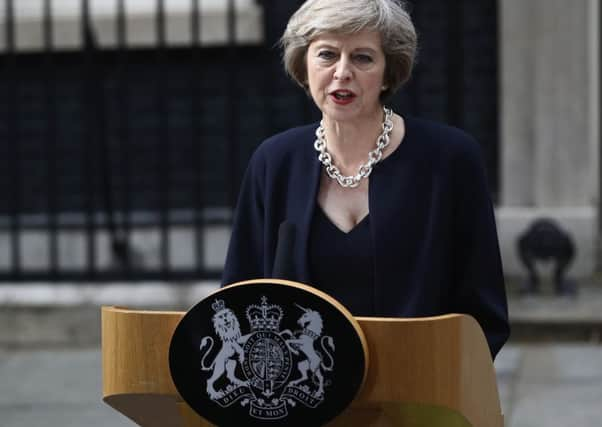Ian Swanson: So much for Theresa May's bid to fight social inequality


BEFORE walking into Number Ten for the first time as Prime Minister, Theresa May declared her determination to fight against the “burning injustice” of inequality in society.
She highlighted a series of the issues facing poorer communities, from poorer access to university to lower life expectancy. And she vowed to make Britain “a country that works for everyone”.
Advertisement
Hide AdAdvertisement
Hide AdBut at the weekend ex-Labour politician Alan Milburn resigned as chairman of the Government’s Social Mobility Commission along with all three of his fellow commissioners, including former Tory Education Secretary Gillian Shephard.
“Talking the talk is all very well, but you also need to walk the walk,” said Mr Milburn. He said the Government “does not seem to have the necessary bandwidth to ensure the rhetoric of healing social division matched with reality”. He complained of “indecision, dysfunctionality and lack of leadership” and said there was “little hope” of Mrs May’s administration delivering a more equal society.
Meanwhile, the Joseph Rowntree Foundation has reported many more pensioners and children are being pushed into poverty. It says there are now 14 million people in poverty in Britain, including four million children and 1.9 million pensioners.
And it warned of new threats emerging to make life even harder for the poorest households, including rising housing costs, higher food and energy bills, debts and not being able to contribute to a pension.
Advertisement
Hide AdAdvertisement
Hide AdThe foundation’s chief executive Campbell Robb observed: “Record employment is not leading to lower poverty, changes to benefits and tax credits are reducing incomes and crippling costs are squeezing budgets to breaking point.”
So much for Mrs May’s Downing Street pledges to tackle inequality. Despite the circumstances of her dramatic ascent to power in place of David Cameron after his disastrous gamble over the EU referendum, she hoped her premiership would not be defined by Brexit, but remembered also for a serious domestic agenda. That was never likely to happen, but even if it were, the policies her Government is pursuing – tax cuts for richer people, more grammar schools and the continued roll-out of Universal Credit despite all the problems and the pleas for a pause – seem to have a great chance of increasing inequality than ending it.
But perhaps it should not come as a surprise that a new Prime Minister’s rhetoric outside Number Ten fails to match their later record. After all, back in 1979, Margaret Thatcher famously quoted St Francis of Assisi: “Where there is discord, may we bring harmony; where there is error, may we bring truth; where there is doubt, may we bring faith; and where there is despair, may we bring hope.”
The Social Mobility Commission resignations are highly embarrassing for the Prime Minister and just add to the general crisis which the Government is already facing, with the investigation into First Secretary Damian Green over alleged sexual harassment and the trials, tribulations and divisions over the Brexit negotiations.
But Mrs May will not want to be viewed in the same light as Mrs Thatcher, whose time in power came to a sudden and brutal end when her colleagues turned against her.